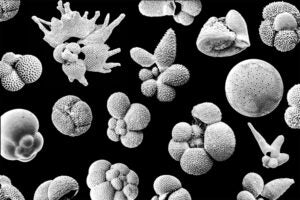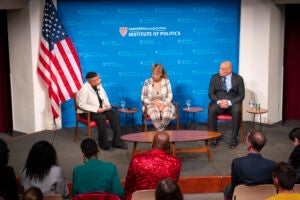Tag: Disease
-
Nation & World
Daley and colleagues create 20 disease-specific stem cell lines
Harvard Stem Cell Institute (HSCI) researcher George Q. Daley, associate director of the Stem Cell Program at Children’s Hospital Boston, has with HSCI colleagues Chad Cowan and Konrad Hochedlinger of Massachusetts General Hospital (MGH) produced a robust new collection of disease-specific stem cell lines, all of which were developed using the new induced pluripotent stem…
-
Nation & World
Joint Harvard-Brazil program fights entrenched diseases
Recently (Jan. 6-21), 15 Harvard and 16 Brazilian students participated in an intensive experience: the first Harvard-Brazil Collaborative Course on Infectious Diseases. The course, which was offered by the Harvard School of Public Health (HSPH) and the Santa Casa de Misericórdia de São Paulo Medical School (FCMSCSP) with the support of the Harvard University Brazil…
-
Nation & World
Science in brief
Researchers identify promising cancer drug target in prostate tumors; Scientists find how neural activity spurs blood flow in the brain: Newfound mechanisms could bolster understanding of brain imaging, aging’s effects; World Health Organization creates new surgical tool to make operations safer everywhere; Invasive treatment appears beneficial for men and high-risk women with certain type of…
-
Nation & World
Broad Institute earns grant to support pathbreaking diabetes study
Researchers at the Broad Institute of Harvard and MIT have received a grant to support novel, integrative research aimed at finding ways to encourage the human body to replenish the cells that are missing in type 1 diabetes.
-
Nation & World
Genetic mechanisms linked to Parkinson’s disease uncovered
A new genetic finding from a group of researchers at Brigham and Women’s Hospital (BWH), the University of Wisconsin School of Medicine and Public Health (SMPH), and the University of Ottawa may help pave the way for the discovery of therapies that could effectively treat Parkinson’s disease (PD).
-
Nation & World
TB talks honor outgoing HSPH dean
Tuberculosis specialists came from universities around the country to discuss the state of the disease at the Harvard School of Public Health (HSPH) and to honor Harvard School of Public Health Dean Barry R. Bloom, who has announced that he will be stepping down.
-
Nation & World
Researchers report successful new laser treatment for vocal-cord cancer
An innovative laser treatment for early vocal-cord cancer, developed at Massachusetts General Hospital (MGH), successfully restores patients’ voices without radiotherapy or traditional surgery, which can permanently damage vocal quality.
-
Nation & World
Risk of death reduced within years of quitting smoking
Women who quit smoking significantly reduce their risk of death from coronary heart disease within five years and have about a 20 percent lower risk of death from smoking-related cancers within that time period, according to a study in the May 7 issue of JAMA.
-
Nation & World
SEAS initiative supported by up to $20 million in BASF funding
The official opening of the BASF Advanced Research Initiative at Harvard was celebrated with an inaugural two-day symposium (April 29-30) on biofilms.
-
Nation & World
First targeted therapy for melanoma brings hope
In a demonstration that even some of the most hard-to-treat tumors may one day succumb to therapies aimed at molecular “weak points,” researchers at Dana-Farber Cancer Institute report the first instance in which metastatic melanoma has been driven into remission by a targeted therapy.
-
Nation & World
Genetics key in new knowledge about complex diseases
Genetic researchers crossed a critical threshold last year in their ability to understand complex diseases, posting a number of new discoveries that advanced knowledge of ailments caused by small contributions from multiple genes, the environment, and other causes.
-
Nation & World
Less sleep, more TV leads to fat toddlers
Infants and toddlers who sleep less than 12 hours a day are twice as likely to become overweight by age 3 than children who sleep longer. In addition, high levels of television viewing combined with less sleep elevate the risk, so that children who sleep less than 12 hours and who view two or more…
-
Nation & World
Panel discusses history, future of alternative therapies
The history of alternative and complementary medical treatments can inform the medicine of today. That was the message of “Sectarian (to Unorthodox to Alternative) to Complementary Medicine: What Historical Perspectives can Tell Modern Medicine,” an afternoon of talks sponsored by the Countway Library’s Center for the History of Medicine on March 26.
-
Nation & World
Harvard graduate student takes good cause and good friend on the road
What’s a 15-year-old boy, confined to a wheelchair with a fatal form of muscular dystrophy, to do on his summer vacation? Take a 7,000-mile road trip across the country with 11 friends. So thought Harvard Graduate School of Education (HGSE) student Logan Smalley Ed.M. ’08, who organized the trek and then captured it in his…
-
Nation & World
MGH initiates Phase I of its diabetes trial
Scientists at Massachusetts General Hospital (MGH) have initiated a Phase I clinical trial to reverse type 1 diabetes. The trial is exploring whether the promising results from the laboratory of Denise Faustman can be applied in human diabetes.
-
Nation & World
Increasing U.S. support could save a million South Africans by 2012
More that 1.2 million deaths could be prevented in South Africa over the next five years by accelerating efforts to provide access to antiretroviral therapy (ART), according to a study released March 13 in the Journal of Infectious Diseases.
-
Nation & World
Protein folding: Life’s vital origami
The way proteins fold, and the good and bad effects of this molecular phenomenon, are what keeps biologist Susan L. Lindquist busy. Lindquist Ph.D. ’76, a Radcliffe Fellow this year, is an award-winning professor and researcher at the Massachusetts Institute of Technology (MIT) and a former director of the Whitehead Institute. She shared her insights…
-
Nation & World
Inhaled TB vaccine more effective than traditional shot
A novel aerosol version of the most common tuberculosis (TB) vaccine, administered directly to the lungs as an oral mist, offers significantly better protection against the disease in experimental animals than a comparable dose of the traditional injected vaccine, researchers report this week (March 12) in the Proceedings of the National Academy of Sciences (PNAS).…
-
Nation & World
Joint Harvard-Brazil program fights entrenched diseases
Recently (Jan. 6-21), 15 Harvard and 16 Brazilian students participated in an intensive experience: the first Harvard-Brazil Collaborative Course on Infectious Diseases. The course, which was offered by the Harvard School of Public Health (HSPH) and the Santa Casa de Misericórdia de São Paulo Medical School (FCMSCSP) with the support of the Harvard University Brazil…
-
Nation & World
HUL launches extensive ‘Contagion’ collection
The Harvard University Library (HUL) Open Collections Program recently launched http://ocp.hul.harvard.edu/contagion. Created with support from Arcadia, the new collection, titled “Contagion: Historical Views of Diseases and Epidemics,” brings carefully selected historical materials from Harvard’s renowned libraries, special collections, and archives to Internet users everywhere.
-
Nation & World
Impact of global warming on health debated
Disagreement over the public health impact of global warming emerged in a symposium Monday morning (Feb. 18) at the annual meeting of the American Association for the Advancement of Science. The colloquium, titled “Sustaining Human Health in a Changing Global Environment,” addressed what hazards can be expected as a result of rapid and continuing climate…
-
Nation & World
Newly identified gene variants associated with prostate cancer risk
Three studies presenting newly identified genetic variants that are associated with increased susceptibility to prostate cancer were published recently (Feb. 10) on the advance online site of Nature Genetics. The 10 gene variants double the number of known variants associated with risk of the disease and are the result of genomewide association studies.
-
Nation & World
Anxiety linked to overestimation of breast cancer risks
Elevated levels of anxiety may cause women with ductal carcinoma in situ (DCIS), the most common form of noninvasive breast cancer, to overestimate their risk of recurrence or dying from breast cancer, suggests a study led by researchers at Harvard-affiliated Dana-Farber Cancer Institute in Boston.
-
Nation & World
Web technology allows health experts from around globe to kibitz
It was close to midnight one day this week in Durban, South Africa, when Harvard AIDS researcher Bruce D. Walker switched on his computer and made a visit to 104 Mt. Auburn St. in Cambridge.
-
Nation & World
BWH-led tuberculosis research project receives $14M NIH grant
Researchers at Brigham and Women’s Hospital (BWH), the Harvard School of Public Health (HSPH), Harvard Medical School (HMS) and Partners In Health (PIH) have received a grant of $14 million over five years from the National Institutes of Health to study multi-drug-resistant tuberculosis (MDR-TB) and extensively drug-resistant tuberculosis (XDR-TB). The goal of the project is…
-
Nation & World
How brain cells make good connections
Harvard neuroscientist Venkatesh N. Murthy has a sunny second-floor office on Divinity Avenue, where he is a professor in Harvard’s Department of Molecular and Cellular Biology. In one corner is a set of weights and a soccer ball — both untouched in over a year, he said, because of an intensely busy schedule.
-
Nation & World
Ethicists, philosophers discuss selling of human organs
In nearly every country in the world, there is a shortage of kidneys for transplantation. In the United States, around 73,000 people are on waiting lists to receive a kidney. Yet 4,000 die every year before the lifesaving organ is available.
-
Nation & World
Research in brief
Major differences in protocols used to determine brain death; Harvard researchers achieve stem cell milestone; Consortium links chromosome abnormality to autism disorders; Blocking HIV infection; Oral osteoporosis meds appear to reduce the risk of jaw degradation; Six new genetic variants linked to heart-disease risk factor; Gene variation may elevate risk of liver tumor in some…
-
Nation & World
Drug helps certain brain tumor patients live longer
People who receive high doses of the chemotherapy drug methotrexate to treat a certain type of brain tumor appear to live longer than people receiving other treatments, according to research published in the Jan. 29 issue of Neurology, the medical journal of the American Academy of Neurology.
-
Nation & World
Blood stem cell’s roles could help clarify pathogenesis
No other stem cell is more thoroughly understood than the blood, or hematopoietic, stem cell. These occasional and rare cells, scattered sparingly throughout the marrow and capable of replenishing an entire blood system, have been the driving force behind successful bone marrow transplants for decades. Scientists, for the most part, have seen this as the…


